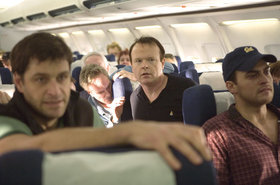Or, Buried Alive on the Fourth of July
 If you're buried alive under a pile of smoldering rubble in an Oliver Stone movie, it seems your salvation may come from one of two places. First, there's Jesus. If he shows up, he may offer to deliver you from suffering, but it will likely mean punching your ticket. Hang on, buddy, because your second saviour is the U.S. Marines. And if the Marines show up, boy howdy are you in good hands. That's the non-ironic gist of Oliver Stone's World Trade Center, a conservative yarn of life in these times rife with sentiment and earnestness. I'll go so far as to say the bit with the Marines is a well-timed moment of catharsis in a movie that needs it. It made me smile and laugh out loud in spite of myself. Sometimes, hokum works pretty beautifully. The film's opening is just lovely — a sober collection of shots of New York City, skyline still intact, coming to life in the morning. It reminded me a little of the majestic opening montage of Woody Allen's Manhattan, set to "Rhapsody in Blue," but this version is laced unavoidably with overwhelming sadness.
If you're buried alive under a pile of smoldering rubble in an Oliver Stone movie, it seems your salvation may come from one of two places. First, there's Jesus. If he shows up, he may offer to deliver you from suffering, but it will likely mean punching your ticket. Hang on, buddy, because your second saviour is the U.S. Marines. And if the Marines show up, boy howdy are you in good hands. That's the non-ironic gist of Oliver Stone's World Trade Center, a conservative yarn of life in these times rife with sentiment and earnestness. I'll go so far as to say the bit with the Marines is a well-timed moment of catharsis in a movie that needs it. It made me smile and laugh out loud in spite of myself. Sometimes, hokum works pretty beautifully. The film's opening is just lovely — a sober collection of shots of New York City, skyline still intact, coming to life in the morning. It reminded me a little of the majestic opening montage of Woody Allen's Manhattan, set to "Rhapsody in Blue," but this version is laced unavoidably with overwhelming sadness.
There's the thing — it's not that hard to make a movie about the World Trade Center attacks that will reduce viewers to tears. Not only is it a terribly sad story, but just about everyone on the planet has a special load of emotional baggage associated with the date. So every docudramatic moment, starting with Nicolas Cage's working-class cop waking up one minute before his alarm goes off, is freighted with impending terror. Me, I was ready to head for the exits during the film's first act. It wasn't just the outright backlot phoniness of the scenes that purported to take place on the streets of lower Manhattan, paperwork loosed from ruptured cubicles and office walls fluttering through the air like tiny confetti in a snow globe. It was the general lack of feeling — the way Stone has his VFX team recreate one of those bodies plunging downward through the air from one of the WTC's burning towers as the film manages to generate exactly zero emotion of its own, to convey no respectful sense of the horror with which such spectacle was received.
I'm not one of those who thinks it's "too soon" for this kind of movie, or feels like the national psyche needs to be coddled slowly back to good health -- in fact, I'm of the mind that a truly great film about 9/11 would have to play a lot like an outright horror movie. The chaos as it's imagined here is so well-contained, so PG-13 glib, that it verges on offensiveness. (I'll make an exception for the sound design, which captures the hellish roar of the fires burning far overhead without stopping to make a big deal out of it.)
But I stuck around and was rewarded not only with the presence of Maria Bello (quite good) and Maggie Gyllenhaal (even better), standing in as audience surrogates but also playing women who are simultaneously strong and vulnerable, defying some of the clichés that usually prop up stories of these kind. And what's going on underground is represented in a kind of minimal cinema — two characters, completely immobilized, chattering desperately at each other in ordinary ways — that seemed much better suited to the story at hand. At first, tedium ensues, and it seems like a major miscalculation has been made in the scriptwriting phase. But, over time, Nicolas Cage and Michael Pena make something of it. Cage struggles with his working-class accent, but manages to build a real character. The babyfaced Pena is outright charming — in over his head from square one, now he's feeling guilty about the guy who swapped places with him before the buildings came down, the argument he had with his wife about the name of their unborn daughter.
It doesn't turn really compelling until night falls and their predicament starts to seem hopeless. (Because it's based on a true story, I was perhaps more willing to try and imagine how the real events must have felt.) That's when Jesus shows up, offering the parched Pena a bottle of water -- code for the release from suffering that only death brings -- that he wisely refuses, followed by the Marines. God and country. World Trade Center really is the kind of old-fashioned, go-USA melodrama that Hollywood used to specialize in during times of war. The studio line that this thing is apolitical is nonsense — Stone even lets one of his Marines snarl a line about the need to "avenge" the 9/11 dead before a title card notifies us that he took two tours of duty in Iraq (however Stone feels about the issue, that plays as an indication of support for the current war rather than some kind of ironic observation that, you know, the enemy in Iraq isn't the same as the enemy that knocked down those buildings).
I'm not lefty-crazy enough that I don't realize Stone is depicting very real sentiments — that one of his film's accomplishments is that it captures feelings of anger and nationalism that were widespread in the wake of the 9/11 attacks. But after the announcement that Stone, of all people was directing a movie called World Trade Center, fans of the cinema of crazy seemed to be licking their lips in anticipation. Was Paramount nuts? But Stone's reputation as an anti-authoritarian firebrand has largely been overstated, especially by critics who wrongly equated his general distrust of authority with leftism. (Platoon, JFK, and Born on the Fourth of July didn't resonate with middle America because they were politically radical.) Judging from the results here, he's pretty happy with the status quo — or at least he can live with the temporary mantle of propagandist.


